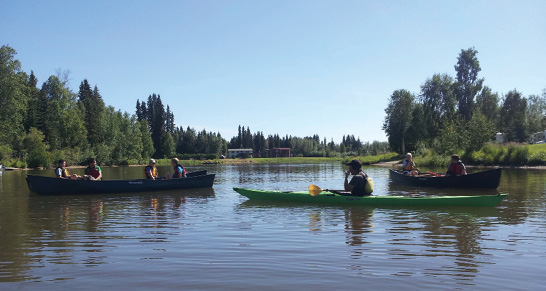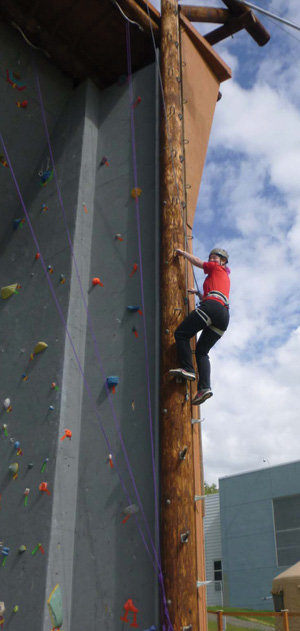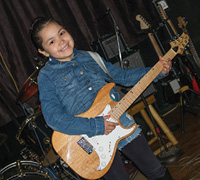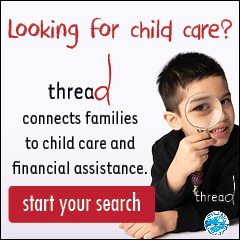Plan for the Best Camp Ever
Ways to make your child’s summer camp experiences more fun and memorable
By Julia Moore

Summer camps are a blast for kids, but to make the most of their experience, parents need to start planning even before the first signs of spring. From arts and academic camps to sports and adventure camps, camp choices are abundant right here in Alaska. But with so many options, how do you pick a high-quality camping experience that will best meet the needs and interests of your child? Read on for expert tips in Alaska Parent’s summer camp primer.
Paring down possibilities
While many camps open registration in March, the sooner you start preparing, the better. When you start searching for camps early, you have the luxury of working it into your budget. Be on the lookout for cost-cutting opportunities, and don’t be afraid to ask for scholarship opportunities, says Amanda Block of the Girl Scouts. “We have that money dedicated to scholarships to help get as many kids to camp as possible.” If you’re sending multiple kids to camp this year, check if there’s a sibling discount – from this point, you can narrow down your search to camps in your budget and camps that interest your children.
Involve your kids in the process from step one to help narrow down camps. Working together helps establish boundaries and expectations for camp. For starters, find out what it is that your child wants to get out of camp. For example: Do they want to really hone in on their music skills? Become a better leader? Also consider any stressors your child is experiencing to avoid overbooking them. Even if your child is in kindergarten, Angela Brown, LPC, recommends having a conversation about how they feel about camp and what they are up for – if they are already stressed, don’t push them into an overnight camp; if they need to burn off energy, make sure they’ll have ample opportunities to do so (such as swimming, playing soccer, etc.).
Take time to share the camp schedule with your child, advises Marcy Richards with the Joy Greisen Jewish Education Center. If he knows when he’s going to camp, when he’ll be picked up, and who is picking him up, he will feel better prepared and more comfortable.

The ‘Growth Zone’
Should kids have input in their camp decisions? Absolutely. If they don’t want to go, they won’t have fun and might become anxious about camp. However, nobody knows your child better than you. Keep their wants and needs in mind, but don’t exclude a camp because it’s not your kid’s first choice. While students who choose the camp or who are familiar with camp activities gain knowledge and enjoy it, “often the ones who are trying something new have the biggest transformation,” notes Nicole Schuh, program director for Alaska Business Week.
If you want your kids to work on specific skills – whether it’s socializing, public speaking or getting their assignments in – you can always ask camp counselors and staff to help put a plan in place. Check in with counselors when picking up your children by asking about specific activities that took place or moments where your child was most engaged, recommends Katie Adrian with Camp Fire Alaska. “It gives parents a great opportunity to connect with their kids directly about what their experience was like,” she says, instead of receiving those all-too-familiar shoulder shrugs and one-word responses. This way you’re informed, engaging your children and pushing them from their comfort zone into their “growth zone,” where they are challenged and learn more about themselves. “Even as adults, we don’t necessarily know what we do and do not like until we try it,” says Sam Braband, director of UAF’s DRAW programs. “Summer is a great time to push your children into trying new activities, meeting new people and stepping out of their comfort zones.”
Engage your kids early
Whether your goal is just to help your kid have a great time or nudge him towards that growth zone, you can cut back stress by getting him excited about camp early. Angela recommends showing your kids positive experiences involving camp, such as:
Watching movies, shows or even clips on the computer showing how camp can be fun;
Reading a book on camping;
Talking to a relative who has gone to camp and can tell your kids about their experiences.
For most camps, you can even visit the camp’s location before the program starts so your child is walking on familiar ground his first day.

When camp time nears, look up recipes for homemade trail mix or granola to make together for camp snacks. For overnight camps, keep non-perishable snacks in mind. Consider packing healthy snacks such as whole grain crackers, pre-popped popcorn, fruits that don’t need to be washed or stored in containers (bananas or oranges), or even seaweed packets, recommends a registered dietician with the Resource Center for Parents and Children in Fairbanks. Be sure to notify the camp of the camper’s allergies or if you suspect allergies, but it’s also a perfect time to talk with your kids about how to handle their allergies in a camp setting: Children need to make staff members aware of their allergy, refuse foods given by anyone other than staff members, keep track of their EpiPens (if necessary), and check food labels.
Check out the camp’s schedules and agendas, which are usually easy to find online, and make great talking points while exploring camp options, or when packing. If your child is old enough, have him pack his own bag. That way he can find those all-important socks, underwear and other basics. If you’re packing for your kid, make sure he knows where his essentials are in his pack or suitcase so he’s ready for anything. “The more pieces they’re engaged in, the better their experience will be,” says Amanda.
Do your homework
Parents in Alaska have a variety of camps to choose from, and many are accredited by the American Camp Association, meaning they have voluntarily agreed to meet up to 300 health and safety standards from staff-to-camper ratios to desired outcomes for the campers. Take time to explore different camp websites and look for accreditations, but don’t limit yourself to what you find online.
Contact information for camp directors should be readily available for you to reach out with important questions on staff training, emergency procedures, or even to ask how they would handle scenarios like a homesick child or student conflicts. Every parent hopes that camp will run smoothly, but when you’re spending nights without your kids, you want to be at ease knowing the staff is prepared for anything. Opening communication with your camp director will save you sleepless nights and ensure your child not only has a phenomenal time, but gains new skills and self-confidence.
Don’t delay – find a camp your child will enjoy by checking out our Summer Camps & Programs Directory.










